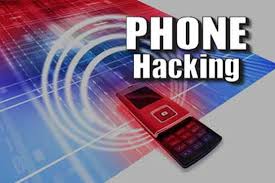Did you know a whopping 91% of us own some sort of cell phone? Of that 91%, approximately 64% of us are using a Smart Phone. It's so convenient, isn't it? We are virtually connected...anytime...anywhere.
Interesting statistics, but how is this relevant? Because a lot of "On-Line" activity is being conducted via cell phone, that leaves us susceptible to cyber criminal activity on our cell phones as well as our computers. AND...this also creates a vulnerability for our phone conversations and our texts!!
Here is an interesting story...
Jane Doe had just hung up from an important and private phone call with a family member. As a family oriented person, keeping up with family and close relatives was important to her. She had asked them to do find out some information for her and, also, to secure some items that she needed, but didn’t want anyone to know about as it was a personal matter.
About a day afterward, "Jane" noticed that some acquaintances (not friends) mentioned items and bits of information from her phone call almost word for word. What made it startling was that this had happened on other occasions, but she just chalked it all up to coincidence. Later on, she found out that all her cell phone calls and text messages were not only being hacked, but leaked out to people she knew.
Someone in her circle of acquaintances had accessed her calls and texts and related bits of her private business to friends and foes alike: and it had been going on for longer than she realized, "Jane" had been a victim of cell phone hacking, her online safety was compromised.
Who would have thought, right?
I'll tell you who "would have thought"...
There is a cyber-company named iSEC partners who demonstrated how texts, cell phone calls and other information was fully disclosed on the Verizon smartphone through the use of a device called femtocel which can be bought for under $300.
The purpose of femtocell, a wireless network extender, is to allow people to improve poor cell phone service. It is self-sufficient because it works like mini-cell phone tower. Employees of iSEC were able to hack into the device and discovered that it could pick up the signal from phones in a 40-foot radius and read all messages transmitted – such as passwords typed online during banking or sensitive corporate emails.
Although Verizon was able to fix the problem, Tom Eston, the Manager of Profiling and Penetration at information security company SecureState, said this type of hacking was only the beginning. He went on to explain that vulnerability was not only among other Verizon devices but other carriers were liable for the same attacks because it was an element very difficult to control.
Mr. Easton explained further that in the past, makeshift towers were made in attempts to capture signals and hack into phones, but the process was more expensive than the trouble it was worth. “The only people who could really do it was state-sponsored governments,” he said. “It’s really become much more practical and easier to do now that we have this new technology.”
And so, here in lies the problem. If this "new technology" makes hacking into our phones easier and more practical, it also makes each and every one of us who use a cell phone extremely vulnerable. Imagine the private, sensitive information you send through your texts and share on your phone calls...unnerving, isn't it?
Your cell phone is not only your own, personal, mini, electronic phone and address book, it also holds personal information and private material. If your phone is internet compatible then it means that it is also connected to your email. Imagine what would happen if someone got into your phone and took this information without your knowledge? Once they got that, they would have access to everything online about you.
SO...
What can YOU do to exercise some degree of security?
To prevent and protect yourself from becoming a victim, here are some guidelines...
- Keep your phone close to you and secure it in a place that is difficult for thieves to get to. Use a case, or strap near to you rather than something easy to snatch. Thieves will think twice before they steal your phone if you have it secured safely.
- If you suspect that your phone has been hacked, or if you phone is stolen, be sure to contact your service provider right away. This can save you spending money from unauthorized use of your phone. Before you purchase your phone, ask your carrier if they provide insurance against this. Finding out afterward will make you liable.
- Use a strong password to lock, or unlock your phone before your (or anyone else) can use it. Make sure it is a strong password and not something (like a phrase) commonly known to everyone.
- Hacking through Bluetooth is one of the fastest and easiest ways for anyone to get to your phone. It doesn’t take a crack criminal to hack through this vein. Be sure to turn your blue tooth off unless you are using it, this will prevent wireless intrusion.
- If anti-virus software is available for your phone download it and keep it updated. Be sure to ask your service provider if this software is available for your phone and, also, check your phone manual to see if there is software for your phone. As simple as downloading a link from email on your phone can cause it to pick up a virus, so anti-virus software should be considered.
Don't put up with cell phone intrusion. No matter who your carrier is, or what type of phone you have, hacking can be prevented by installing mobile security products. These products can be purchased in stores or online and are just as important as internet security is for your computer.
BUT...
What if you suspect that you might have been hacked? Here are some clues that will help in that determination...
The first thing to do is to pay attention to any sounds made during calls on your phone. If you hear strange, unfamiliar clicking sounds in the background of the conversation, or notice that you, or the caller’s voice is echoing, or notice any white noise, this can definitely be an indication that someone is trying to connect, hack and listen in.
If your phone lights up all by itself even when you are not using it then check it out. If it turns on, or off by itself be sure to check that out as well. Some phones can be controlled through remote access via radio control.
Feel your phone and its battery to see if they are excessively hot. If they are hot when you touch them then chances that spyware software is being put to use on your phone.
Be sure to check your phone bill and keep track of all charges. If you are charged double, or triple for every call or text you made, it means that spyware is being used to send your transactions to other persons and websites. Your information is then downloaded, your number is accessed and other people are running up your bill by using your number.
IF YOUR PHONE IS HACKED, get in touch with the FBI and your service provider immediately. To get in contact with the FBI, go into google and logon to the site. Find the Contact Us button and select FBI Tips and Public Leads. This is the form on the Reporting Crime section that you can fill out with all the prevalent information and submit to them. Be sure to put your personal information in (ex.. name, address, etc.) so that they can get back to you. Give as many details as possible. If you want to make the report over the phone call the FBI number 800-225-5324
To make the report to your service provider, contact them online (calling would be better because you are more sure of a speedy response) and give them the details of what happened and why you suspect hacking. Try to get a new number to discharge any charges that were acquired during the hacking.
Building awareness about the dangers of hacking and what to expect is something that should be done regularly. Phone companies and mobile service providers should have pamphlets available for customers which detail how to protect them from hacking and how to prevent it in the first place.
And of course, if you have any additional questions or concerns, please contact us... 626-449-5549/alcalaconsulting.com

